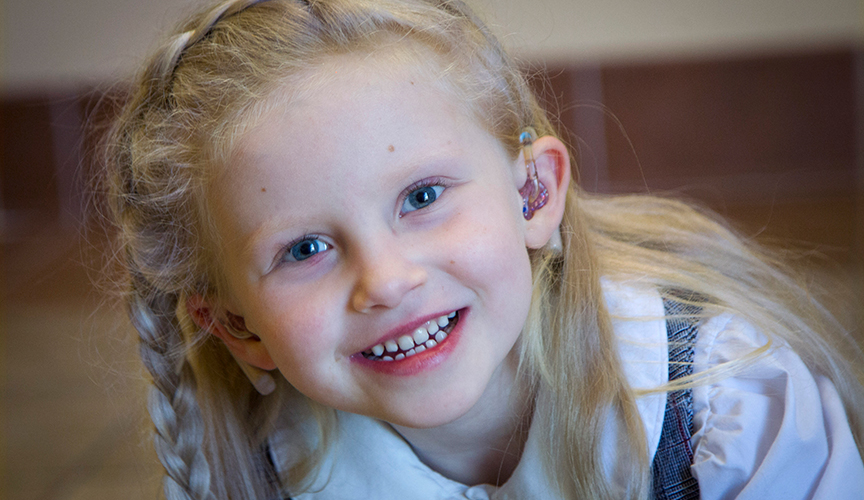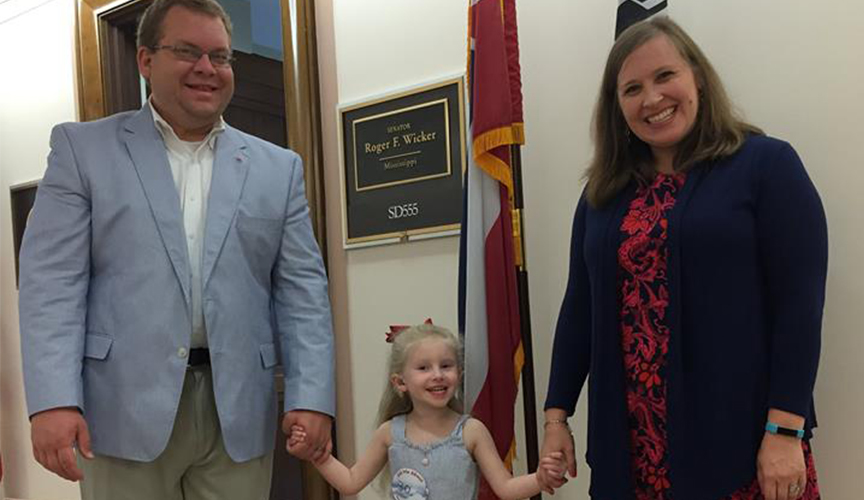Medically Complex
New legislation aims to coordinate care, reduce costs for children with complex medical conditions
Diagnosed with a congenital heart defect and bilateral hearing loss, Lizzie Kate Gray has had two major surgeries, nearly 30 hospital stays and hundreds of follow-up and therapy appointments in her five short years.
It’s a journey Lizzie Kate’s parents, Josh and Laurie Gray, never expected after a healthy pregnancy and smooth delivery. The heart diagnosis came first – within hours of Lizzie Kate’s birth on a Friday night in May. She looked ashen, Laurie said. Her coloring, a “bit off.”
The Grays were grateful for Lizzie Kate’s relatively smooth recovery from heart surgery, but another devastating blow was around the corner. Lizzie Kate failed her newborn hearing screening, and a second test a couple weeks later confirmed the Grays’ fears: she was deaf.

“We were just learning how to be parents for the first time,” said Laurie. “Let alone parents of a heart baby who couldn’t hear.”
The Grays are one of nearly 3 million families in the United States facing the hard road of caring for a medically complex child – coordinating multiple specialty appointments, keeping track of medications, staying on top of therapy to make sure their child doesn’t fall behind.
A bipartisan bill called the Advancing Care for Exceptional Kids Act of 2015 (ACE Kids Act) aims to improve the delivery of care for children like Lizzie Kate. Reintroduced this year, the ACE Kids Act proposes a system of care designed around the unique health care needs of children with complex medical conditions.
The term “medical complexity” describes those with chronic health conditions affecting multiple organs and requiring a lifetime of care.
“These kids need experts in many different disciplines, which means they are best cared for only in the most comprehensive centers with a full range of services like large children’s hospitals,” said Jon McCullers, MD, pediatrician-in-chief at Le Bonheur Children’s Hospital and chair of the Department of Pediatrics at the University of Tennessee Health Science Center.
The majority of medically complex children – nearly 2 million – rely on Medicaid to help them access care. They account for only 6 percent of those who use Medicaid, but nearly 40 percent of all Medicaid costs.
The goal of the ACE Kids Act: to better coordinate multidisciplinary care for these children and reduce costs.

The model proposed under the ACE Kids Act establishes a medical home for children who meet the definition of medical complexity. The medical home – like a children’s hospital or other equipped entity -- would serve as a hub and partner with other specialists to provide the full range of care. This enhanced coordination reduces the burden on families and improves efficiencies, says McCullers. Advocates of the legislation estimate a cost savings of nearly $13 billion over 10 years for Medicaid through reduced hospital admissions and emergency room visits and fewer duplicated tests and procedures.
The new legislation would it also make it easier for families to travel across state lines for care – as is often necessary due to the limited number of experts who can care for these kids’ unique conditions.
ACE Kids Act [S. 298 (Grassley/Bennet)/H.R. 546 (Barton/Castor)]
At a glance:
- Optional for states that want to improve and better coordinate care for children with medical complexities with accountable teams of pediatric provider
- Works within a state’s existing Medicaid structure
- Cost savings and improved quality for medically complex patients, according to published studies
- Bipartisan support with 39 cosponsors in the Senate and 223 cosponsors in the House
Help us provide the best care for kids.
Le Bonheur Children's Hospital depends on the generosity of friends like you to help us serve 250,000 children each year, regardless of their family’s ability to pay. Every gift helps us improve the lives of children.
Donate Now










